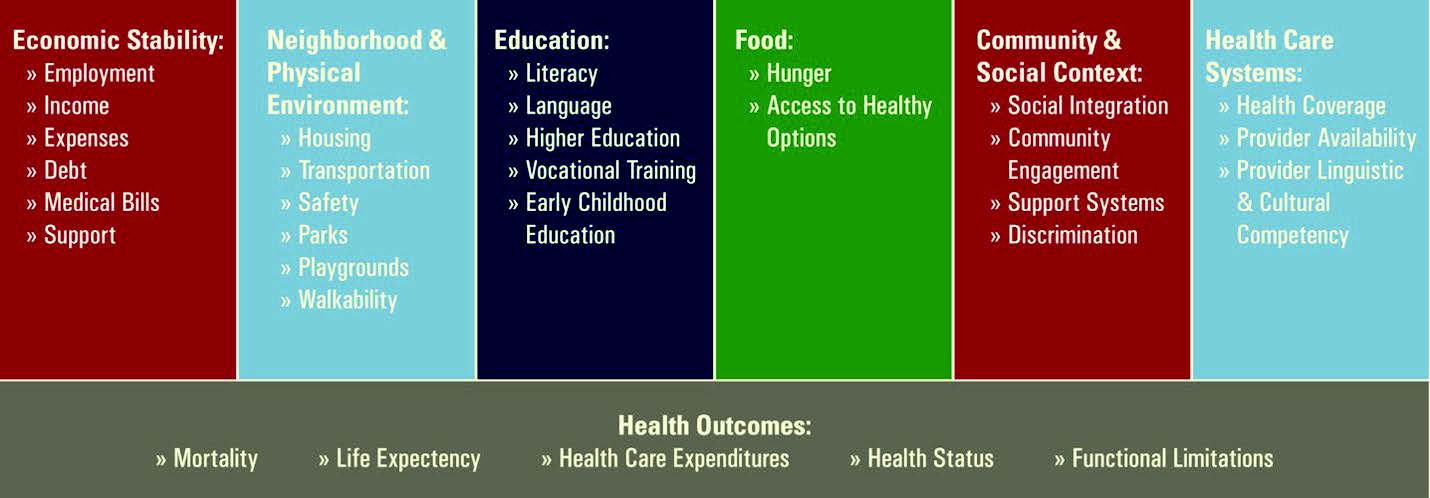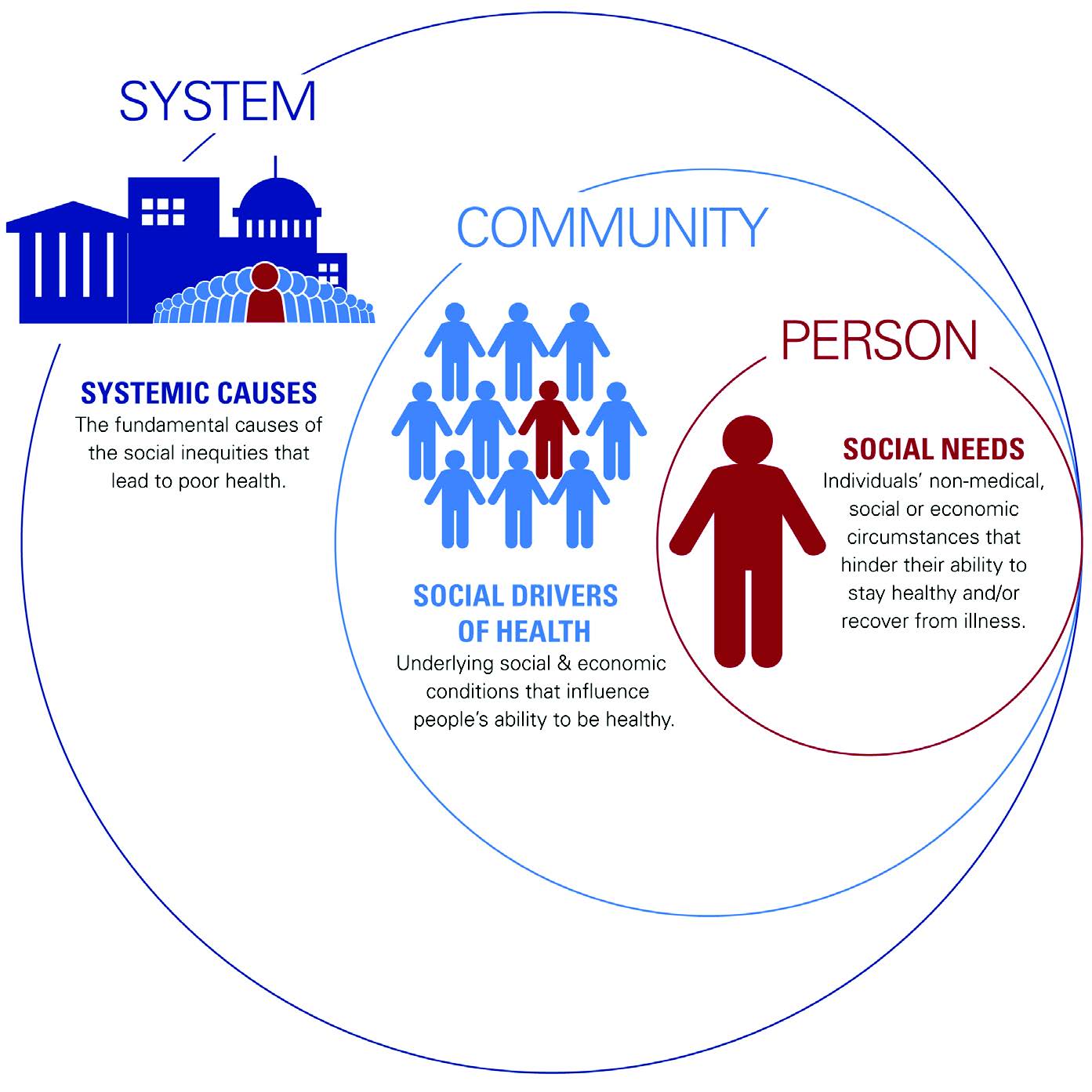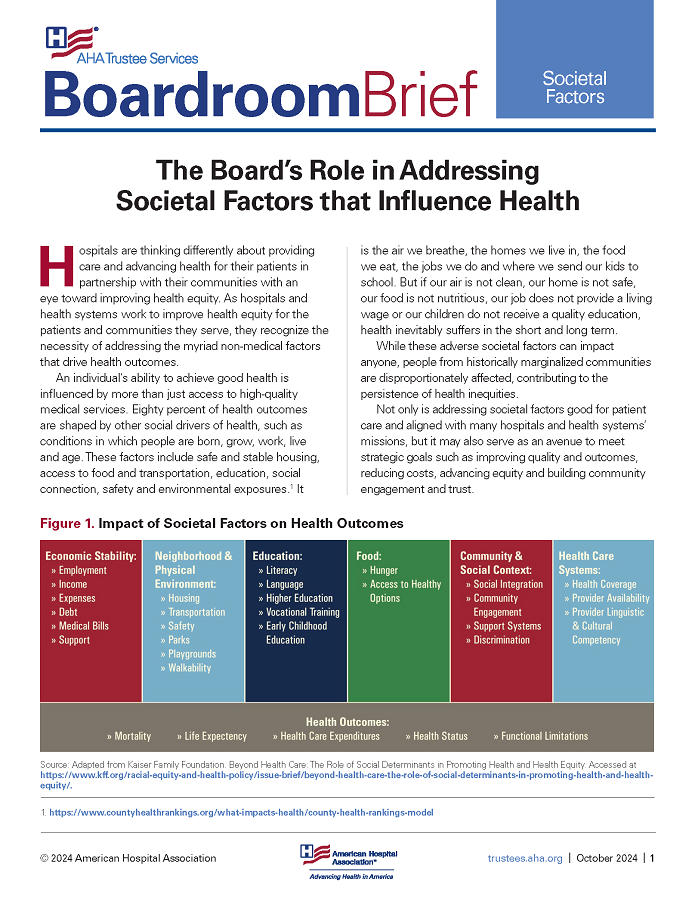Boardroom Brief: The Board’s Role in Addressing Societal Factors that Influence Health
Societal Factors
Background
Hospitals are thinking differently about providing care and advancing health for their patients in partnership with their communities with an eye toward improving health equity. As hospitals and health systems work to improve health equity for the patients and communities they serve, they recognize the necessity of addressing the myriad non-medical factors that drive health outcomes.
An individual’s ability to achieve good health is influenced by more than just access to high-quality medical services. Eighty percent of health outcomes are shaped by other social drivers of health, such as conditions in which people are born, grow, work, live and age. These factors include safe and stable housing, access to food and transportation, education, social connection, safety and environmental exposures.1 It is the air we breathe, the homes we live in, the food we eat, the jobs we do and where we send our kids to school. But if our air is not clean, our home is not safe, our food is not nutritious, our job does not provide a living wage or our children do not receive a quality education, health inevitably suffers in the short and long term.
While these adverse societal factors can impact anyone, people from historically marginalized communities are disproportionately affected, contributing to the persistence of health inequities.
Not only is addressing societal factors good for patient care and aligned with many hospitals and health systems’ missions, but it may also serve as an avenue to meet strategic goals such as improving quality and outcomes, reducing costs, advancing equity and building community engagement and trust.
Figure 1. Impact of Societal Factors on Health Outcomes

Source: Adapted from Kaiser Family Foundation. Beyond Health Care: The Role of Social Determinants in Promoting Health and Health Equity. Accessed at https://www.kff.org/racial-equity-and-health-policy/issue-brief/beyond-health-care-the-role-of-social-determinants-in-promoting-health-and-health-equity/.
Addressing the full scope and complexity of the societal factors that influence health is a massive, multi-sector undertaking. As cornerstones of their communities, hospitals and health systems play a key role — in partnership with other stakeholders — to positively impact the health of the patients and communities they serve.
Societal Factors that Influence Health: A Framework for Hospitals
The AHA has developed numerous resources to support hospitals in addressing this challenging yet essential work. The Societal Factors of Health that Influence Health Framework for Hospitals guides hospital leaders’ thinking about how they can impact these societal factors at three levels, moving from individual to systemic. While this work may seem daunting, the framework strives to provide an accessible approach and clarifies the role that hospitals and health care organizations can take. These approaches are complementary; each is necessary but not sufficient to tackle these complex societal issues.
Figure 2. Societal Factors that Influence Health

Key Definitions
Social needs are individuals’ non-medical social or economic circumstances that hinder their ability to stay healthy and/ or recover from illness. When patients present for health care services, their provider may detect that they are experiencing a social need such as a lack of stable housing or limited access to healthy food. The provider can help mitigate these social or economic challenges by connecting them with resources offered by the hospital or referring the patient to community partners or social service agencies that can help.
Social drivers of health are the underlying social and economic conditions that influence people’s ability to be healthy. Social drivers of health exist at the community level, can impact anyone living in a community and include issues like food or housing security. Initiatives to address social drivers of health are often done in partnership with community stakeholders and aim to improve the environment where people live.
Systemic causes are the fundamental causes of the social inequities that lead to poor health. These systemic inequities can take the form of racism, sexism, generational poverty or redlining by financial institutions. Hospitals should partner with other stakeholders to effect policy, system, environmental or cultural changes connected to health at the local, state or national level.
The Role of Hospital and Health System Boards in Addressing Societal Factors that Influence Health
Board members should be knowledgeable of the societal factors that influence the health and well-being of the patients and communities they serve and how their organization addresses these factors. Below are four roles trustees can play to help their organizations:
1. Community Connector
Trustees, as representatives of their communities, serve as a link between the hospital and the community. They can facilitate community conversations through the community health assessment (CHA) process and foster relationships with community stakeholders through formal and informal community engagement strategies.
2. Leading Stakeholder
Board members can hold hospital leaders accountable for identifying and reaching societal factors and health equity goals. Hospital and health system boards should ensure their organizations have the infrastructure needed to implement strategies that address societal factors. By establishing board committees focused on health equity, integrating societal factors into goals and metrics and aligning this work with strategic priorities, trustees can hold leaders accountable for making progress.
3. Advocate
As leaders in their communities, trustees can advise local and federal policymakers to adopt policies to address the societal factors that influence health in various sectors.
4. Advisor
Trustees can share their observations about community health needs and advance their understanding of what hospitals can do to address societal factors. Using these insights, trustees can engage with hospital leaders about how to best implement sustainable solutions to address societal factors. This could include advising on community benefit spending and other investments that impact patients and community members.
Trustee Discussion Questions
- What social needs are most prevalent in our patient population? How do we know? Which populations are most affected?
- What actions can we take at each layer of the Societal Factors that Influence Health Framework? In what areas could our hospital lead, and where would we need to partner?
- How are societal factors represented in our hospital’s strategic plan? Are they connected to quality or any other strategic performance goals?
- How can our societal factors and health equity strategies be tied to the CHA and improvement plan?
- What are three priority areas that we could focus on to improve outcomes by addressing societal factors?
- What policies can our hospital advocate for to address societal factors? What policy or environmental changes would make a difference in our community?
- What type of partners do we need to advance work on societal factors? What partners are available in our community? What resources can our hospital or health system contribute?
AHA Resources
- Societal Factors that Influence Health
- A Trustee’s Guide to Population Health: Building New Foundations Linking Care with Community
- The Board’s Role in Advancing Healthier, More Equitable Communities
- Population Health Discussion Guide
- Addressing the Social Determinants of Health
- Institute for Diversity and Health Equity
- Health Equity Roadmap: Diverse Representation in Leadership and Governance
- AHA Community Health Improvement
- Community Health Assessment Toolkit
- Housing and Health: A Roadmap for the Future

